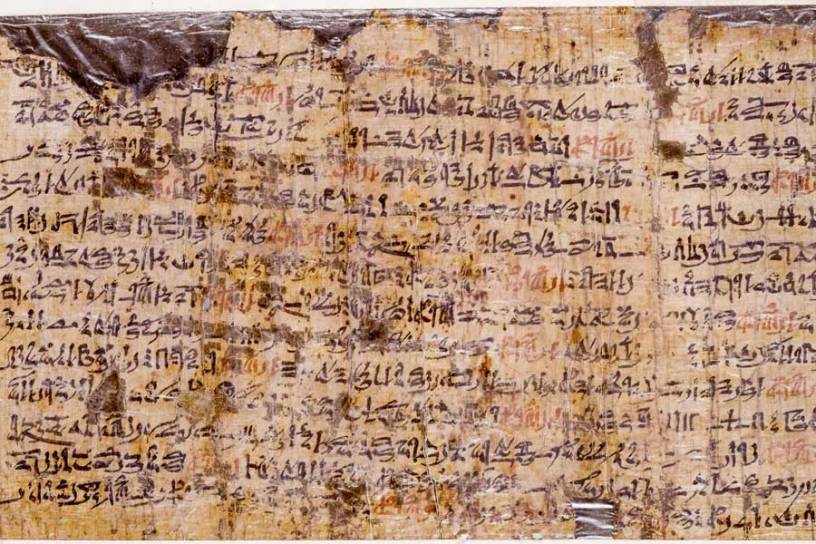

Ironically, if one considers that “truth” must be based on two pillars: an accurate chronology anchored on absolute dates (Herodotus’ principle) and reliable documents coming from critical editions (Thucydides’ principle), that implies an amazing conclusion: those who believe Egyptologists are actually the real gullible ones. However, according to most Egyptologists, there is absolutely no evidence of Moses and the Exodus in Egyptian documents, which leads them to conclude that the whole biblical story is a myth written for gullible people.

To be or not to be is a crucial question regarding Moses as well as the Exodus because, according to the Bible, the character related to that famous event forms the basis of the Passover which meant the Promised Land for Jews and later the Paradise for Christians. What are the Egyptian documents underlying this hypothesis: none, and what is the chronology of this mysterious war: nobody knows! Consequently, who to believe: Moses or Egyptologists? GLASSTREE 2017 Finally, Ahmose I, the first pharaoh of the 18th Dynasty of Egypt, won the war against the Hyksos. For them, “it seems” that several campaigns against the stronghold at Avaris were needed, during at least one decade, before the Hyksos were finally dislodged and driven from Lower Egypt. For these scholars the liberation from Egypt after the “10 plagues”, as it is written in the Book of Exodus, is quite different from the historical “war of liberation against the Hyksos”. Several scholars (Finkelstein, Dever and others) posit that the Exodus narrative may have developed from collective memories of the Hyksos expulsions of Semitic Canaanites from Egypt, possibly elaborated on to encourage resistance to the 7th century domination of Judah by Egypt. The author is a young earth creationist, who is commenting on how mainstream scientists and New Agers are missing the boat (willfully in many cases) as they interpret the evidences about our ancient history.For Egyptologists as well as archaeologists, and even now Bible scholars, the answer to the question: Who to believe: Moses or Egyptologists? is obvious (Dever: 2003, 233): Rather than attempt to defend the factual historicity of the Exodus traditions, I suggest that we must understand the Exodus story precisely as a myth, specifically as a “metaphor for liberation” (.) There is ample evidence that the Exodus story was read metaphorically already in ancient times, certainly so by the early rabbis and by later rabbinical commentaries. Now read much more about all this, in line with biblical history, science of the future, old school man!

(described in the Ipuwer Papyrus), and the sea level rise then too, you can see that was the time of the Exodus of the Jews out of Egypt, the end of the Ice Age, all confirming the history in the sacred Torah very nicely.

So with the catastrophic clmate change having begun actually circa 1500 b.c. when the Ice Age ended, he says that a tsunami put under the ruins now found in Donana park, just one of many submerged ruins’ sites off the coast of Spain, many of them in deeper water, predicatably not discussed by Jacobovici who still propones the darwinists’s timeline.Īnd Harvey Weiss at Yale has demonstrated that a catastrophic climate change all around the world ended the bronze age, when landscapes where cities flourished turned to desert, saying that time was circa 2000 b.c., however those dates are based upon seriously flawed carbon 14 dating and kings lists which included sequentially rulers ‘though many of whom ruled contemporaneously, the case too with egyptian pharohs. Jacobovici’s documentary about Atlantis posits that biblical Tarshish (“the Ships of Tarshish”) and Atlantis were one-and-the-same, historically valid, however not realizing that Atlantis went under circa 1500 b.c. Renowned hebrew scholars of archaeology such as Harvey Weiss at Yale and documentarian Simcha Jacobovici are dancing around the fact that the Ice Age ended actually circa 1500 b.c., yet when they finally do come to this realization, to tell the world, they will be confidently announcing that archaeology does in fact conform to the biblical timeline, further demonstrating that science and the Bible are mutually inclusive.


 0 kommentar(er)
0 kommentar(er)
